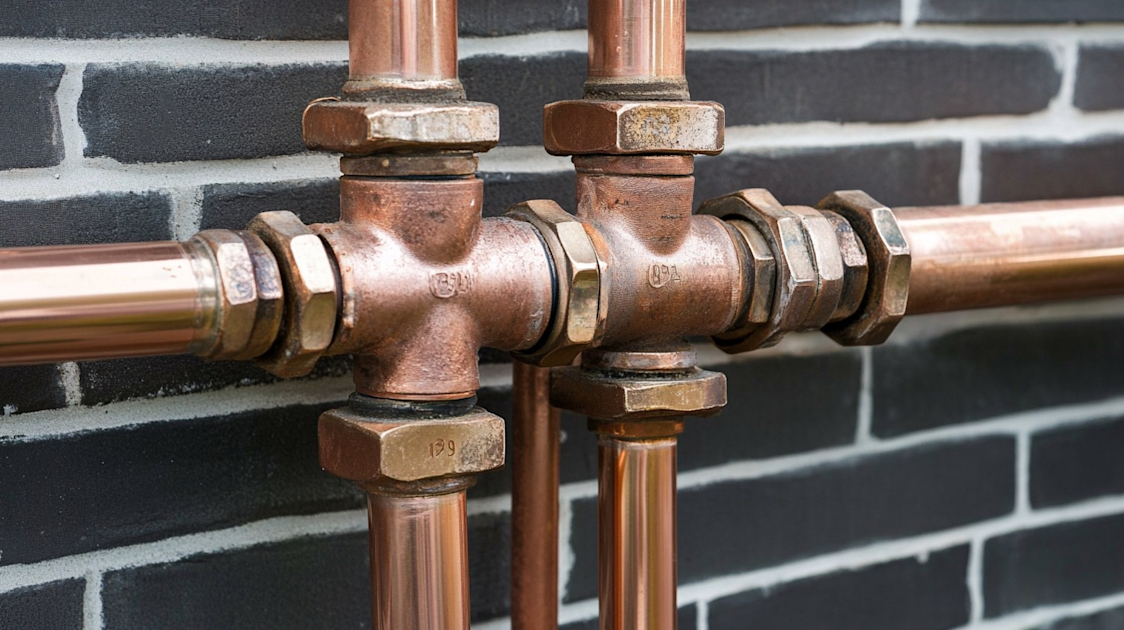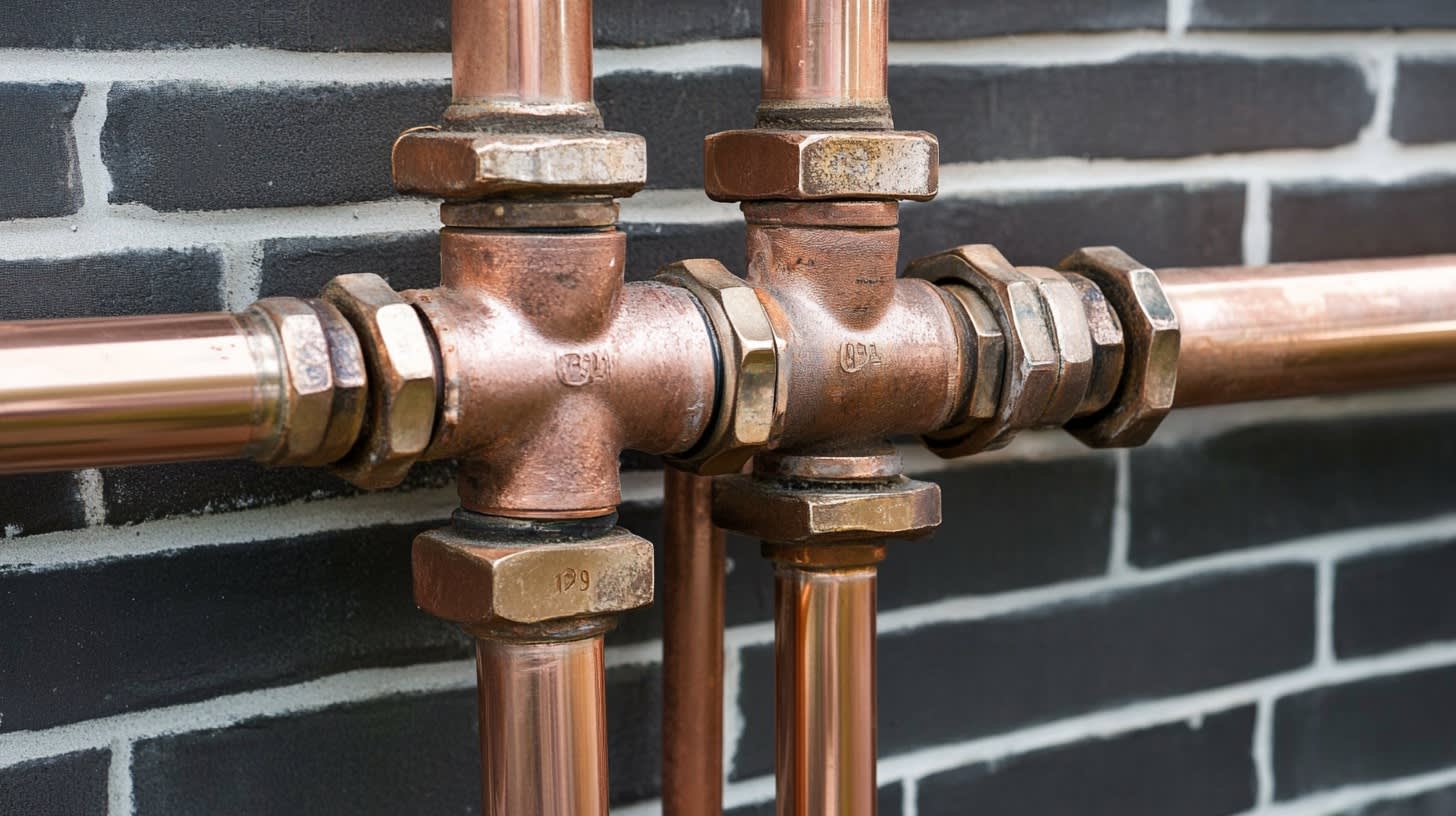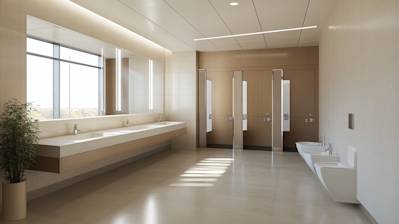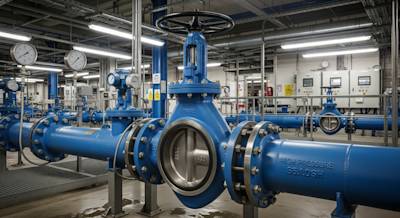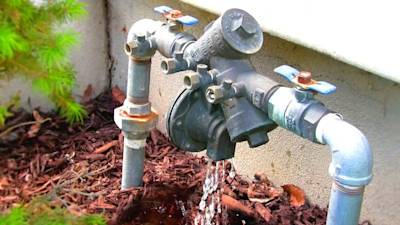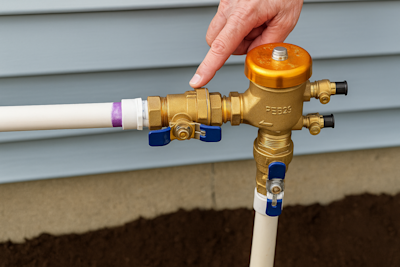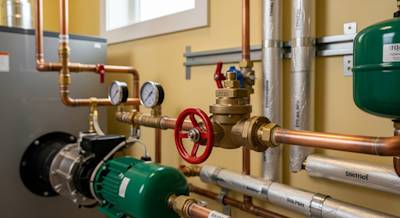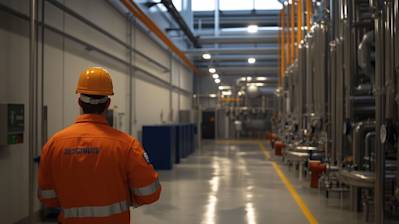Copper pipework plays a significant role in various sectors, including construction, heating and cooling systems, as well as in plumbing. As a key component in facilitating effective utility systems, understanding its characteristics, benefits, application, and installation is pivotal for professionals in the construction industry.
Understanding Copper Piping
A piping system constitutes a network of tubes designed to carry fluids from one location to another. Among the many types of piping materials available, copper stands out due to its unique properties.
Copper, a widely-used metal in construction, exhibits a striking balance between durability, malleability, and conductivity. It is predominantly utilized in pipework because it can withstand a high level of pressure and temperature fluctuations, making it suitable for areas necessitating a robust and reliable pipework system.
Key Features of Copper
- Ductility: Copper pipes can be easily bent into various shapes, making installation in tight spaces convenient.
- Corrosion resistance: Unlike some metals, copper does not rust, making it a durable and long-lasting solution.
- Thermal conductivity: Copper's superior heat dispersion properties make it the go-to choice for hot water supply lines.
Types of Copper Pipes
In copper pipework, different pipe types are suitable for different applications. Here are the main types of copper pipes;
1. Type M Copper Pipe
With the thinnest walls among copper pipes, Type M is commonly used for interior cold and hot water distribution, above-ground heating systems, and HVAC (Heat, Ventilation and Air Conditioning) applications.
2. Type L Copper Pipe
Type L pipes feature thicker walls than Type M and are often used for installation within residences for water supply lines. They provide greater durability and can withstand higher pressure levels.
3. Type K Copper Pipe
Type K pipes have the thickest walls, making them the most durable type. They are commonly used in heavy-duty applications such as sewer lines, buried underground, and supply lines.
Installation of Copper Pipes
The installation of copper pipes involves a systematic procedure to ensure safety and effectiveness of the pipework system. Follow these general steps for successful copper pipe installation:
Plan the Layout: Before starting, a layout plan of where the pipes will be installed should be drawn out to avoid any complications during the process.
Cutting the Pipes: Copper pipes are cut to the desired length using a pipe cutter or hacksaw. It's crucial to get the correct measurements for a proper fit.
Cleaning the Pipes: Once cut, the pipe should be cleaned and deburred to remove any sharp edges or debris which can affect flow within the pipe.
Joining the Pipes: Copper pipes are then joined using a process known as soldering, where two pieces of copper are fused together using a filler material.
Testing the System: After installation, the entire system should be pressure tested to check for any leaks or weak points in the pipework.
Installation: Once tested, the final phase is to install the copper pipes as planned.
Copper Pipework Maintenance
Maintenance is one of the crucial aspects of ensuring the longevity of the copper pipework. Regular checks can help identify problems early and address them before they escalate. Some of these maintenance activities include:
- Leak Detection: Watch for signs of moisture around joints and welds, which could indicate leaks.
- Corrosion Checks: Despite being corrosion-resistant, acidic conditions may affect copper pipes over time. Inspecting for spots of discoloration will help identify locations of potential corrosion.
- Cleaning: Regular cleaning helps to remove debris and contaminants, preventing blockages and maintaining water quality.
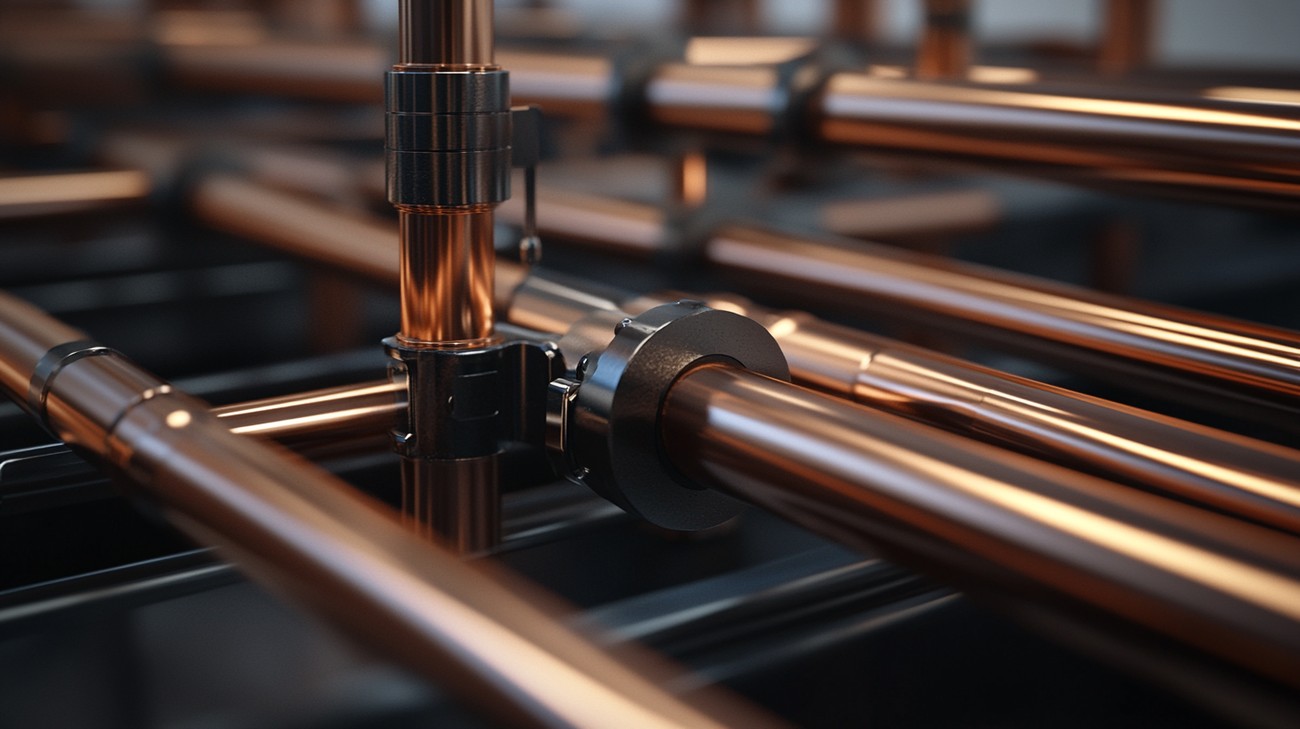
Frequently Asked Questions about Copper Pipework
How do I install copper pipework?
Installing copper pipework involves cutting the pipe to the correct length, cleaning the ends, applying a flux compound, fitting the pipes together, and then soldering. It's a process that requires specific tools and safety measures, so it's typically best left to professionals if you don't have experience with this type of work.
Is copper pipework more expensive than other piping materials?
Generally, copper pipework can be more expensive than other types of piping materials, such as PVC or PEX. However, the long life and durability of copper can offset the initial cost, making it a cost-effective solution over time.
Can copper pipes contaminate water?
Under normal conditions, copper pipes do not contaminate water. That being said, in cases where the water has a low pH (meaning it's acidic), it can corrode the pipes and cause copper to leach into the water. Therefore, if your water source is particularly acidic, it might be worth considering other piping materials.
How can I tell if my copper pipework needs replacing?
Copper pipework can show signs of needing replacement, including leaks, discolored water, or pinhole leaks. Also, if your pipework is over 50 years old, it may be nearing the end of its typical lifespan.
Can copper pipework be used for gas lines?
While it's not common, copper pipework can be utilized in some situations for gas lines. However, it's important to consider local codes and regulations, as some areas may prohibit this use.
Can I recycle copper pipework?
Indeed, one of the great things about copper is that it's recyclable. Due to its high scrap value, it's cost-effective to recycle copper, making it a good option for environmentally conscious construction.
Does cold weather affect copper pipework?
Extreme cold can have an impact on copper pipework. If water inside the pipes freezes, it expands, which can lead to cracked or burst pipes. However, this is a risk with all types of pipework, not just copper.
What are pipe fittings in copper pipework?
Pipe fittings are used to connect lengths of copper pipework together, or to change the direction or shape of the pipework. Fittings can include elbows, tees, and couplings, among others.
Is there a way to prevent corrosion in copper pipework?
Yes, there are several ways to prevent corrosion in copper pipework. This includes regulating pH levels, reducing the amount of oxygen in the water, and limiting the water's temperature. It may also involve adding a protective layer to the inside of the pipes to prevent contact with corrosive substances.
Do I need to worry about copper pipework in terms of fire safety?
Copper pipework has superior fire safety compared to many other materials. Copper won't burn or support combustion, so it won't carry fire through floors, walls, or ceilings. It also won't release toxic gases when heated, making copper a safe choice for pipework in terms of fire safety.

Pros of Copper Pipework
Longevity
Durability
One of the main advantages of copper pipes is their durability. Copper is a solid and tough material that can withstand a lot of wear and tear. It can resist high pressure, extreme weather conditions, and even natural disasters like earthquakes. Therefore, pipelines made from copper have the potential to last for decades, minimising the frequency and cost of replacement or repair.
Resistance to Corrosion & Rust
Unlike iron and steel pipes, copper pipes are rust-resistant. Copper is a corrosion-resistant metal, which means it won’t deteriorate over time when exposed to water and oxygen, key contributory factors to the rusting process. This is a major advantage, particularly in plumbing applications where pipes are constantly exposed to water.
Excellent Conductivity
Heat Transfer
Copper has excellent thermal conductivity which means it quickly transfers heat. This makes copper pipes ideal for transporting hot water around a house or industrial building, contributing to their extensive use in heating systems such as radiators and underfloor heating.
Electrical Conductivity
Being a great electrical conductor, copper pipes can also safely ground electrical wiring. This can be a crucial safety feature within buildings, reducing the potential for electrical accidents.
Recyclability
Copper is 100% recyclable. Even after years of use, copper pipes can be recycled back into new products with lesser energy consumption compared to producing new copper. This characteristic makes copper an environmentally friendly choice.
Health Aspects
Copper pipes are often preferable in terms of health. Unlike plastics, copper does not release any toxins into the water they transport. Moreover, copper has been found to have antibacterial properties, which helps to ensure the hygiene and safety of water supplies.
Cons of Copper Pipework
Installation Costs
Price of Material
The main disadvantage of copper pipes is their cost. Copper is a valuable metal and this is reflected in its price. Compared to alternative materials like PVC, copper pipes can be significantly more expensive to purchase.
Labor Cost
Copper pipes also require soldering during installation, which is a skillful job. Therefore, professional plumbers often charge more for installing copper pipework versus cheaper, easier alternatives such as PVC or PEX piping, leading to high labor costs.
Sensitivity to Acidic Water
While Copper is generally rust-resistant, it can still corrode in certain circumstances. If your water has a pH level below 6.5, it is considered acidic and can cause premature corrosion to copper pipes, leading to leaks and potential water quality issues.
Noise and Water Hammer
Copper pipes can be noisy. They tend to amplify the sound of running water or any shifts within the pipe, which can be a nuisance within a building. Similarly, copper pipes are more susceptible to water hammer - the loud banging noise created when water flow is suddenly shut off.
Potential for Theft
Due to copper's high value, copper pipes can make a building an attractive target for thieves. Stripping abandoned or under-construction buildings of copper has become a common occurrence, leading to significant repair and replacement costs.
Effect on Taste of Water
Though generally safe, the water that has stood in copper pipes can occasionally have a slight metallic taste. Particularly in newer pipes, a small amount of copper can leach into the water, especially if the water is acidic. While this is typically not a health risk, it may be undesirable for some.
Myths and Misconceptions about Copper Pipework
Misinformation and myths about copper pipework can lead to improper usage, poor installation, misunderstandings, and even significant plumbing problems down the line. This comprehensive list aims to debunk many of these misconceptions, and provide valuable insights into the realities of copper pipework.
Copper Pipework is Expensive
One of the leading misconceptions about copper pipework is that it is prohibitively expensive due to its material. However, while the initial costs might seem higher than alternative materials such as PVC, the durability and low maintenance costs associated with copper pipework make it a cost-effective choice in the long run. Also, using copper for critical components of your plumbing system can add value to your property.
Copper Pipes are Not Environmentally-Friendly
This all-too-common myth contends that copper isn't an environmentally-friendly option due to mining and processing practices. But in reality, copper pipework is highly recyclable. Not only can discarded copper pipe be remelted and reused, but the metal retains virtually 100% of its original performance capabilities, even after multiple rounds of recycling.
Copper Piping Causes Water to Taste Metallic
Another widespread myth about copper piping is that it causes tap water to have a metallic taste. In truth, if maintained properly, copper pipes do not alter the taste, smell, or color of your water. When water has an off-tasting flavor, other factors such as poor water quality, older pipes, or the onset of pipe corrosion are typically to blame.
Using Copper Pipe Guarantees No Pipe Bursting
While copper piping is known for its durability, it is not immune to breaks or cracks under extreme conditions. For example, in freezing temperatures, the water inside the pipe can freeze and expand, causing even copper pipes to burst. While copper pipes resist corrosion far better than iron or galvanized pipes, they are not impervious to all plumbing issues.
Copper Comes Only in Rigid, Non-flexible Forms
Copper piping indeed comes in rigid forms, but it also comes in flexible forms, known as soft copper, used primarily for refrigerant lines in HVAC systems and other applications requiring the pipe’s flexibility. This contradicts the misconception that all copper piping is rigid and unbendable.
Only Professionals Can Install Copper Pipework
While professional installation is often recommended to ensure best outcomes, technically-minded homeowners can also successfully install copper pipework themselves, espeсially if equipped with the right information. However, keep in mind that proper soldering techniques and safety precautions are essential to avoid any mishaps.
Copper Pipes are Prone to Corrosion
Despite the perception, copper pipes are resistant to corrosion under normal conditions. However, in areas with highly acidic or aggressive water, some corrosion could occur. In such cases, it might be better to explore pipe material options better suited to the conditions.
Copper Pipes are a Thing of The Past
Even amid new plumbing materials, copper has maintained its place as a reliable option for both domestic and commercial plumbing systems. The outstanding durability, recyclability, and overall performance of copper pipework make it a valuable material choice, now and in the future.
All Copper Pipes are the Same
Different types and grades of copper pipes are available, each specifically designed for different applications. For instance, Type M has thin walls and is mostly used in residential projects, while Type K has thicker walls and is used in commercial, high pressure, and underground service applications.
Copper Interferes with the Internet
This myth contends that copper pipes can affect Wi-Fi signals. However, there's no evidence to suggest that copper pipework within a building interferes with the internet or Wi-Fi signal. If a Wi-Fi signal is weak, it's likely due to the distance from the router or walls impeding the signal, not the presence of copper pipework.
It's critical to distinguish facts from fiction when it comes to copper pipework. Armed with this knowledge, home and business owners can make informed choices about their plumbing systems, ensuring durability and functionality for years to come.
Summary
Overall, copper pipework has proven its worth in various fields including plumbing, heating, and refrigeration. Its durability means it can withstand even the toughest conditions, lasting for decades without the need for replacement. Plus, it's recyclable, so it's not only efficient but also environmentally friendly.
But like anything else, copper pipework isn't perfect. It's more expensive than alternative materials such as PEX or PVC. And although it's normally easy to work with, installation can be harder in certain situations. Still, many believe that its benefits outweigh these drawbacks, making it a top choice for both contractors and DIY enthusiasts.
It's also worth noting that copper pipework requires certain skills for proper installation. Therefore, it's always best to hire a professional if you're unsure about doing it yourself. While it might cost a bit more upfront, it can save money down the line by minimizing potential issues that could arise due to poor installation.
About KYPD Plumbing
KYPD Plumbing is your go-to company in Lexington, KY for all your plumbing needs. We have a fierce dedication to top-notch service and unbeatable customer satisfaction. Our team of highly-trained professionals has years of experience, showcasing expertise in everything from minor repairs to major installations and everything in between. Whether you're dealing with a leaky faucet, a broken sewer line, or you simply want to give your bathroom a new look, KYPD Plumbing has got you covered. Your comfort and satisfaction are our top priority, and we're always just one quick call away.
Tags: metal, plumbing, construction,

